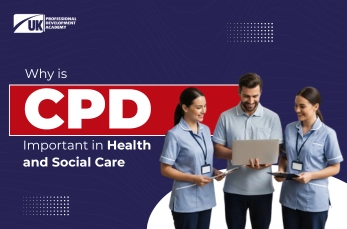Have you ever thought about taking a short course to enhance your skills? If you’re still unsure, then it is the perfect time to start learning. Because in today’s competitive job market, staying relevant requires more than just experience; it demands continuous growth and enhanced skill sets.
According to research, 59% of employees believe that training directly improves their performance, which means even a small investment in your learning can have a significant impact on your career. Short courses offer a practical, time-efficient way to gain in-demand skills, explore new opportunities, and position yourself ahead of the competition. In this article, you will learn the advantages of short courses and how they can boost your career growth.
Short Courses vs Traditional Programs
Short courses focus on practical skills you need right now, unlike traditional programs that cover lengthy theoretical subjects. You can learn and apply new knowledge in weeks, or even days, rather than spending years on a degree. As a result, you stay ahead in fast-changing industries like technology, digital marketing, healthcare, and project management.
Moreover, industries evolve constantly with new tools, regulations, and methods. Employers value professionals who adapt quickly, and short courses help you do exactly that. They also let you customise your learning path and respond instantly to market trends, something traditional programs often cannot offer.
Is a Short Course Important for Career Growth?
A short course plays a crucial role in your career growth because it offers targeted, practical learning that delivers results in a relatively short time. Is a short course good enough to make a real difference in your career? The answer is yes, because it helps you gain in-demand skills and stay competitive in fast-changing industries. Unlike lengthy academic programs, short courses focus on specific skills that you can immediately apply in your workplace.
They also provide opportunities to expand your professional network, explore new career directions, and adapt quickly to emerging trends or technologies. You can increase your employability, earn higher salaries, and achieve greater job security by continuously upgrading your abilities through short courses.
Top 7 Advantages of Short Courses for Career Growth
In this era of continuous learning, short courses give you result-oriented opportunities to enhance your skills and explore new career paths. Let’s examine the advantages of short courses and how they are becoming more valuable in the job industry:
- Professional Development
Do you know that 90% of employees are more likely to stay with a company if they receive development opportunities? That’s because professional growth is a powerful tool for your career. Whether you master a new software, improve leadership presence, or learn conflict resolution, short courses will address specific challenges in your current role and also prepare you for future growth opportunities.
You adapt to industry changes, build cross-industry relevance, and even test new career paths without committing to a long-term program. Ever wondered, do short courses look good on a CV? These micro-credentials not only look good but also strengthen your professional brand when added to your CV or LinkedIn. In short, these skills make you more adaptable, competitive, and future-ready, directly accelerating your career growth.
- Flexible Learning Options
Short courses provide you with a flexible learning scenario that not only saves your time but also offers adaptable and innovative ways of learning. You can easily grasp information and understand complex concepts through video lectures or quizzes. In this way, you will retain more knowledge and easily implement it in the future. You can also take advantage of live webinars and get answers to your questions. This kind of flexible and innovative approach to learning makes you ready for future challenges and improves your skill sets.
- Networking Opportunities
When was the last time you learned alongside people who could become your future collaborators, mentors, or clients? If you can’t remember, short courses give you that chance. They bring together professionals from different industries, letting you connect with people you wouldn’t meet in your daily work.
Many short courses are led by active industry experts, giving you direct access to mentorship and insider insights. Even online programs let you build a global network without leaving your desk. As a result, these connections expand your professional circle, keep you updated on industry trends, and open doors to new opportunities.
- Increased Adaptibility
What if staying ahead in your career depends less on your experience and more on adaptability? Short courses offer a powerful way to build this essential skill. They allow you to learn new tools, techniques, and industry knowledge quickly. These courses also encourage you to embrace change rather than resist it, while you can also enhance your ability to connect concepts across fields for innovative problem-solving.
These adaptability skills enable you to confidently step into unfamiliar roles and qualify for a broader range of job opportunities. Most importantly, the habit of continuous short-term learning keeps your skills updated, and you remain competitive even during economic shifts or career transitions.
- Enhanced Skill Sets
Short courses are a fast and effective way to enhance your skill set and give you a career boost. Many programs offer practical, hands-on projects that produce portfolio-worthy work and bridge any gaps in your current expertise. You can learn tools and techniques that employers actively seek, along with the chance to explore niche specialisations without a long-term commitment.
Along with technical expertise, short courses also strengthen your essential soft skills like communication, teamwork, and leadership qualities, thereby boosting your professional credibility. You can even adapt to various roles and position yourself for promotions, with a diverse skill set.
- Increased Earning Potential
Short courses increase your earning potential because they teach you the skills that open doors to higher-paying jobs. You gain specialised expertise quickly, so you can negotiate better salaries, secure promotions, or expand your services if you are self-employed. In fact, when many professionals ask which course is high in demand, the answer often includes accounting and finance, health and social care, business management, and several other fields that continue to grow.
Moreover, recognised CPD certifications strengthen your credibility during pay discussions and make you stand out as a versatile professional. As you complete these targeted qualifications, you unlock faster career growth and access freelance or remote work opportunities that offer competitive global rates.
If you want to take advantage of these benefits, the UK Professional Development Academy (UKPDA) offers flexible CPD short courses that match industry demand. As a result, you not only increase your current income but also protect your long-term earning power while staying relevant in your profession.
Career Exploration
What if you can try out a new profession without risking years of study or money? Well, short courses provide you with a flexible and low-risk way to explore different career paths. Before committing to a long-term degree, you may ask yourself, which course has the most job opportunities? Then you can discover your interests, job opportunities, and natural abilities and explore a course that aligns with your skills and industry needs.
This exploration may uncover your hidden talents, help bridge the gap between your interests and the market’s demands, and build a versatile portfolio that appeals to employers. Ultimately, short courses allow you to make confident and informed career decisions that align with both your passion and growth potential.
Which Course is Best for Career Growth?
When choosing the best course for career growth, it’s essential to consider your professional goals and the skills that are currently in demand. Courses that focus on leadership and management, personal development, and industry-specific expertise give you a remarkable boost in your career. These programmes enhance your professional skills, such as coaching, mentoring, goal setting, and conflict resolution, helping you advance in your career. Consequently, the best course depends on your current skills, career aspirations, and the industry you want to excel in.
Advance Your Career with Short Courses
Short courses act as a powerful tool for career growth because they deliver practical and focused learning. They let you gain in-demand skills quickly and explore exciting new career opportunities without committing years to traditional study.
To meet this need, the UK Professional Development Academy (UKPDA) offers result-oriented learning designed to support you at every stage of your career. Its CPD-accredited short courses provide hands-on, industry-relevant training in areas such as project management, professional development, accounting and finance, cybersecurity, HR management, and more.
In addition, these courses give you the flexibility to learn at your own pace while using interactive, quiz-based assessments that reinforce your knowledge. As a result, you build valuable skills, expand your professional network, and stay competitive in today’s fast-changing workplace. Clearly, the advantages of short courses extend far beyond just learning; they create real opportunities for lasting career success.
















